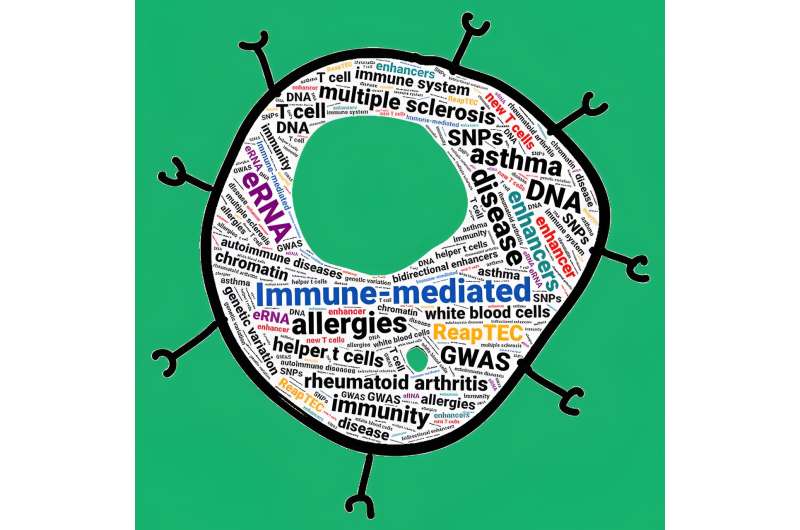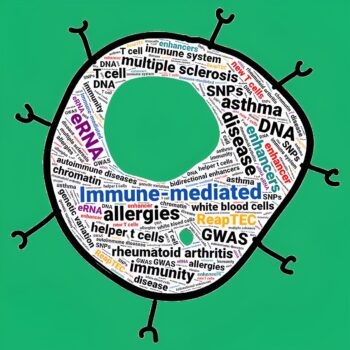
Researchers led by Yasuhiro Murakawa on the RIKEN Middle for Integrative Medical Sciences (IMS) and Kyoto College in Japan and IFOM ETS in Italy have found a number of uncommon kinds of helper T cells which might be related to immune issues akin to a number of sclerosis, rheumatoid arthritis, and even bronchial asthma.
Published in Science, the discoveries had been made attainable by a newly developed know-how they name ReapTEC, which recognized genetic enhancers in uncommon T cell subtypes which might be linked to particular immune disorders. The brand new T cell atlas is publicly out there and will assist in the event of latest drug therapies for immune-mediated ailments.
Helper T cells are a sort of white blood cell that make up a big a part of the immune system. They acknowledge pathogens and regulate the immune response. Many immune-mediated ailments are brought on by irregular T cell perform. In autoimmune diseases like a number of sclerosis, they mistakenly assault elements of the physique as in the event that they had been pathogens.
Within the case of allergic reactions, T cells overreact to innocent substances within the surroundings like pollen. We all know of a number of frequent T cells, however latest research have proven that uncommon and specialised kinds of T cells exist, and so they is perhaps associated to immune-mediated ailments.
Inside all cells, together with T cells, there are areas of DNA known as “enhancers.” This DNA doesn’t code for proteins. As an alternative, it codes for small items of RNA, and enhances the expression of different genes. Variations in T cell enhancer DNA due to this fact result in variations in gene expression, and this may have an effect on how T cells perform. Some enhancers are bidirectional, which implies that each strands of the DNA are used as templates for enhancer RNA.
The researchers from a number of completely different laboratories at RIKEN IMS, in addition to colleagues at different institutes, teamed as much as develop the brand new ReapTEC know-how and search for connections between bidirectional T cell enhancers and immune ailments.
After analyzing about one million human T cells, they discovered a number of teams of uncommon T cell varieties, accounting for lower than 5% of the full. Making use of ReapTEC to those cells recognized virtually 63,000 lively bidirectional enhancers. To find out whether or not any of those enhancers are associated to immune ailments, they turned to genome-wide association studies (GWAS), which have reported quite a few genetic variants, known as single-nucleotide polymorphisms, which might be associated to varied immune ailments.
When the researchers mixed the GWAS knowledge with the outcomes of their ReapTEC evaluation, they discovered that genetic variants for immune-mediated ailments had been typically positioned inside the bidirectional enhancer DNA of the uncommon T cells that they’d recognized. In distinction, genetic variants for neurological ailments didn’t present an identical sample, that means that the bidirectional enhancers in these uncommon T cells are associated particularly to immune-mediated ailments.
Going even deeper into the info, the researchers had been in a position to present that particular person enhancers in sure uncommon T cells are associated to particular immune ailments. General, among the many 63,000 bidirectional enhancers, they had been in a position to determine 606 that included single-nucleotide polymorphisms associated to 18 immune-mediated ailments.
Lastly, the researchers had been in a position to determine among the genes which might be the targets of those disease-related enhancers. For instance, once they activated an enhancer that contained a genetic variant associated to inflammatory bowel illness, the ensuing enhancer RNA triggered upregulation of the IL7R gene.
“Within the short-term, we’ve got developed a brand new genomics methodology that can be utilized by researchers around the globe,” says Murakawa. “Utilizing this methodology, we found new kinds of helper T cells in addition to genes associated to immune issues. We hope that this information will result in a greater understanding of the genetic mechanisms underlying human immune-mediated ailments.”
Within the long-term, the researchers consider follow-up experiments will have the ability to determine new molecules that can be utilized to deal with immune-mediated ailments.
Extra info:
Akiko Oguchi et al, An atlas of transcribed enhancers throughout helper T cell range for decoding human ailments, Science (2024). DOI: 10.1126/science.add8394. www.science.org/doi/10.1126/science.add8394
Quotation:
Scientists uncover new T cells and genes associated to immune issues (2024, July 4)
retrieved 5 July 2024
from https://medicalxpress.com/information/2024-07-scientists-cells-genes-immune-disorders.html
This doc is topic to copyright. Other than any honest dealing for the aim of personal examine or analysis, no
half could also be reproduced with out the written permission. The content material is supplied for info functions solely.





